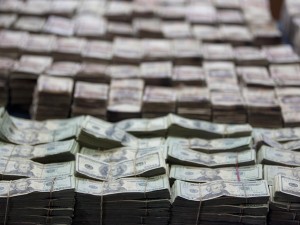MANILA — The Philippine government is selling 25-year global bonds worth at least $500 million, the Duterte administration’s first foray in the offshore bond market.
The dollar bonds due 2042 to be sold offshore starting Wednesday (Tuesday in the US) were aimed at raising more money to fund the national budget, especially infrastructure projects amid the plan to increase spending to over 7 percent of the gross domestic product by 2022.
National Treasurer Roberto B. Tan earlier said the Bureau of the Treasury had been authorized by the Bangko Sentral ng Pilipinas as well as the Office of the President to raise $500 million in new money from global bonds on top of $1.5 billion for liability management.
The Philippine government designated Citigroup Global Markets Inc., Credit Suisse Securities (USA) LLC, Deutsche Bank Securities Inc., Standard Chartered Bank as well as UBS AG Hong Kong Branch as joint lead managers for the offshore bond sale.
These new bonds will be settled on February 2.
Besides the new bonds, the government will also embark on liability management by exchanging 14 earlier issued bonds maturing between 2019 and 2037.
Citigroup Global Markets Inc., Credit Suisse Securities (USA) LLC, Deutsche Bank Securities Inc., Standard Chartered Bank and UBS AG Hong Kong Branch will act as collective dealer managers, while Deutsche Bank Securities will act as billing and delivering bank for the bond swap.
The liability management exercise will start at about 8 p.m. New York City time on Jan. 17 (or 9 a.m. Manila time on Jan. 18), and expire at 2 p.m. New York City time on Jan. 18 (3 a.m. Manila time on Jan. 19).
In a statement, debt watcher Fitch Ratings said it assigned an expected rating of “BBB-” to the Philippines’ forthcoming US dollar-denominated bonds.
“The Philippines intends to use the proceeds from the bond sale to pay the purchase price and accrued interest of its own securities repurchased in an associated debt management operation. Residual proceeds may be used for general budget financing purposes,” Fitch said.
As domestic interest rates remain relatively low, the Duterte administration wanted to finance its programmed wider deficit of 3 percent of the gross domestic product in the next six years through a borrowing mix of 80-percent local and 20-percent foreign. SFM
